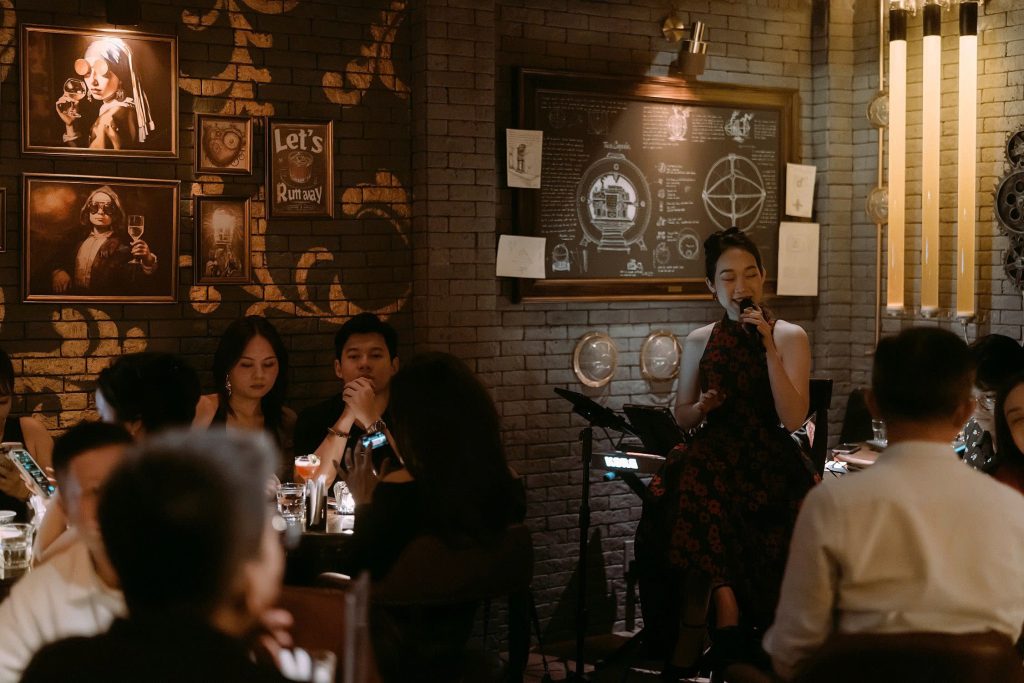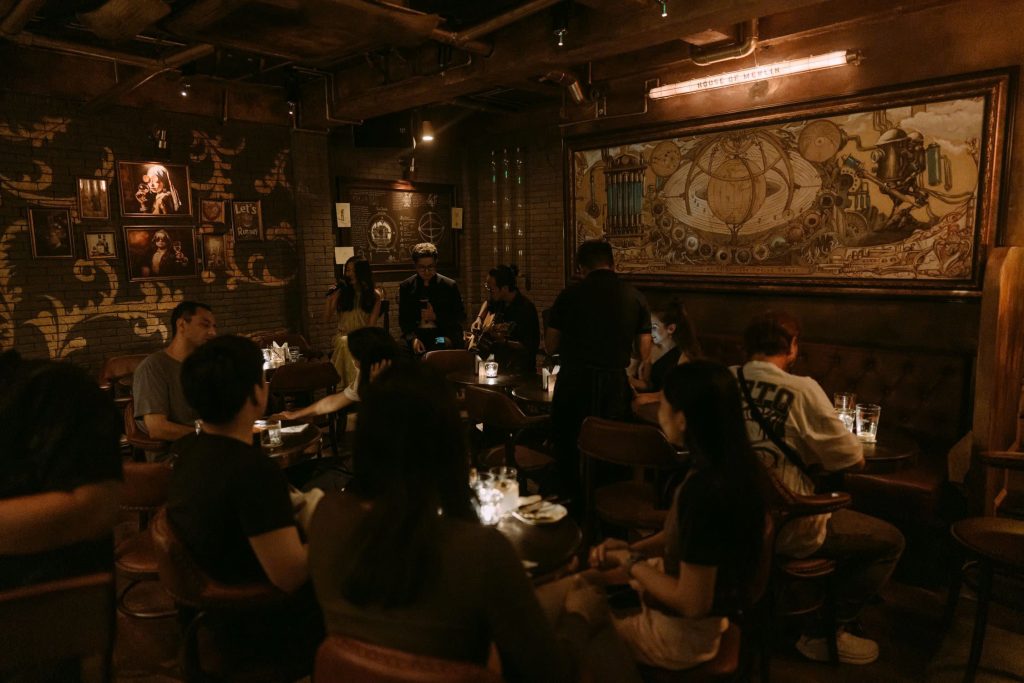My name is Niall Mackay, host of A Vietnam Podcast.
I recorded this episode at House of Merlin, one of my favorite places to grab a cocktail in Saigon. It’s got this cool steampunk vibe, live music, and honestly, some of the best drinks in the city.
My guest was Nguyen Van Nam, a young Gen Z bartender who works at House of Merlin, one of the Best Cocktail Bars in Ho Chi Minh City
Let’s see what a Gen Z person talks about Gen Z, his bartender life, and the stories about cocktails.
The Craft of Cocktails
I asked him to make us a couple of drinks during the episode, and he brought out two of House of Merlin’s signature cocktails.
The first was called “Stoggy”, a bold, smoky drink made with bourbon and Islay whisky, aged in a small barrel behind the bar. What made it stand out was the use of saffron, one of the most expensive spices in the world. You could smell it before you even took a sip—it had depth and character, just like a good story.
The second was the “Papa quiri”, a lighter drink inspired by the classic Daiquiri. It had tropical fruit, Malibu, and a bit of a Vietnamese twist with local flavors and garnishes.
It was fruity, refreshing, and way more approachable—perfect for someone new to cocktails.

What I loved about Nam’s approach was that he didn’t just mix drinks—he told stories through them. Each cocktail was a small expression of creativity, care, and culture. And that’s something I think more people should appreciate when they go to a bar.
That’s what makes House of Merlin stand out—and why it deserves a spot among the best bars in the city.
You can try on your own, find House of Merlin here!
Gen Z in Vietnam: Lazy, Talented, or Misunderstood?
One of the most interesting parts of my chat with Nam was when we talked about Gen Z in Vietnam. I asked him how he would describe his generation, and he said this:
“Lazy, but talented.”
At first, I laughed. But the more we talked, the more it made sense.
Nam explained that a lot of Gen Z in Vietnam grew up in a very different world from their parents or grandparents. Many older Vietnamese worked on farms, in factories, or in tough jobs just to survive. Today’s youth, especially in cities like Saigon, have more options—and more freedom. They want flexibility, creativity, and meaning in their work.
Nam admitted that some Gen Z might seem lazy because they don’t want to do the “dirty” jobs, like cleaning toilets or working 12-hour shifts. But he also pointed out that Gen Z are full of ideas. They want to find faster, smarter ways to do things. That’s the talent.
We also talked about money. Older generations saved everything. Gen Z tends to spend on experiences—travel, good food, nightlife. It’s not always about saving for a house. It’s about enjoying life now.
Vietnam has changed fast. And Gen Z, like Nam, are trying to figure out who they are in a world their parents wouldn’t recognize.
The Introvert Label
Something I’ve noticed in Vietnam—especially among younger people—is how many of them say they’re introverts. I’ve met a lot of students and staff who tell me that right away, even before I’ve gotten to know them. And I’ve found it funny because I’ve never once heard someone say, “Hi, I’m an extrovert.”
Nam said the same thing about himself when he messaged me before the podcast: “I’m an introvert.” And at first, I believed him. But then I watched him behind the bar—chatting with customers, explaining cocktails, sharing stories. That didn’t look very introverted to me.
Nam admitted that when he first started bartending, he didn’t talk to anyone. He just did his job quietly. But over time, he realized something: when customers smiled, he felt good. Their happiness made him want to connect more. Slowly, he opened up.

I think hospitality can be amazing for people like Nam. It gives them small, safe ways to connect with others. He may still call himself an introvert, and maybe he is—but he’s also someone who listens, responds, and makes people feel welcome.
In the end, maybe being an introvert doesn’t mean you’re quiet all the time. Maybe it just means you connect differently. And Nam has found his way to do that, one cocktail at a time.
Drinks, Gender, and Subtle Sexism
One thing I brought up during the episode was how some bars in Vietnam still have “drinks for ladies” printed right on the menu. I’ve even seen servers automatically hand the stronger drink to the man, and the lighter one to the woman, even when the order was the opposite.

I asked Nam about this, and he admitted something honestly: when female customers come in, he usually recommends something light, fruity, and beautiful. It’s what he thinks they’ll enjoy. And to be fair, many do.
But it made me think: is this just a cultural habit, or is it a kind of subtle sexism?
Nam didn’t mean any harm, of course. And I’m sure most bartenders don’t. But it shows how deep these ideas run. We associate certain drinks with gender, even without thinking about it. Whisky is “manly.” Sweet cocktails are “for women.” But why?
I don’t think there’s a clear answer. It’s just something worth noticing—and questioning. Maybe the best drink for someone has nothing to do with gender, and everything to do with what makes them happy.
Why Foreigners Matter to Young Vietnamese
One of the things Nam said that really stuck with me was how much he enjoys talking to foreigners who live in Vietnam, not just tourists passing through. He sees it as a chance to practice English, but also to exchange ideas and learn about different cultures.
He said that talking to people from other countries has helped him grow, not just in language, but in confidence and perspective. And honestly, I think that’s something we don’t always recognize. For many young Vietnamese like Nam, every conversation with an expat is a step toward a broader worldview.
It gave me hope. Vietnam’s younger generation isn’t just open—they’re curious, engaged, and eager to connect. And that kind of mindset will shape the future of this country in a really exciting way.
Conclusion – The House Of Merlin
Talking with Nam reminded me that behind every cocktail is a person with a story—and often, a quiet strength. He may call himself an introvert, but through bartending, he’s found a way to connect with people, express creativity, and challenge expectations.

